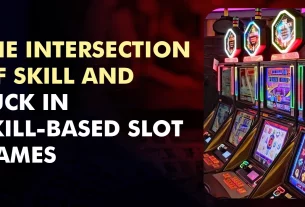Can You Make a Profit Playing Skill-Based Slot Machines?
Slot machines have been a mainstay of casinos for a long time, luring players in with their dazzling lights, mesmerizing music, and the allure of winning large. These games have historically relied solely on chance, with no place for strategy or talent. However, a brand-new subcategory of slots has emerged: skill-based slots. These cutting-edge machines blur the lines between traditional slots and video games, which combine skill and decision-making elements. This blog aims to investigate the world of skill-based slots while examining the likelihood of making money from them. Check out the details of the best online slot games real money:
Knowledge of Skill-Based Slot Machines
Slot machines that reward skill represent a break from the conventional idea of merely pushing a lever and leaving the result to chance. These devices incorporate interactive and skill-required elements and take design cues from well-known video games. In this situation, players are required to actively participate by making choices that directly affect the outcome of the game – actions similar to those seen in video games, such as precisely timing jumps or aiming.
The likelihood of a player winning is strongly correlated with how well they can carry out these acts. These skill-based slot machines distinguish themselves from traditional slots by emphasizing player input and elegant execution. As a result, they provide a more engaging and dynamic gaming experience.
The Promise of Profit
Slot machines with a skill component may appear to be a lucrative business opportunity. After all, shouldn’t skilled players have a higher probability of succeeding if there is a factor of skill? While this reasoning is accurate to a certain extent, a number of obstacles make it difficult to continuously profit from skill-based slots.
Learning Curve
Players experience a learning curve as they become familiar with skill-based slots’ mechanics, controls, and strategies. Players may first suffer losses while they get used to the new situation. Losses, however, can become victories as ability increases over time, emphasizing the progressive nature of learning these games.
Varied Skill Levels
Players in skill-based roles display various skill levels, much like in video games. While competent players maintain steady profitability, inexperienced players find it difficult to profit, especially when playing against more experienced opponents. The variety of ability levels emphasizes how important player skill is to overall success.
House Edge
Casinos maintain a house edge in these slots, just like traditional ones, despite the skill-based components. The casino will always make money because of its inherent advantage. Although player skill might influence specific results, the constant house edge highlights the casino’s ongoing advantage.
Game Complexity
Slot machines that use skill have varied levels of complexity. Some have complicated mechanics that need a lot of practice to perfect. Because of the learning curve and time commitment necessary, its intricacy may deter casual gamers looking for quick wins because they favor quick and simple games.
Competition
The competition between players that skill-based slots frequently engender increases complexity. The possibility for profit may be impacted by the demands of maintaining success against knowledgeable opponents. The requirement to continuously outperform skilled opponents adds a competitive factor that alters the games’ overall profitability equation.
Stakes and Winnings
The stakes and possible winnings greatly impact how profitable skill-based slots are. In high-stakes games, higher bets entail higher risks and profits. This dynamic relationship, which can lead to increased gains or losses, shows how bet size significantly affects the possible financial results in various games.
Chance’s Position
Even while skill-based slot machines surely have a place for it, chance still plays a crucial role. Like classic slots, these games frequently incorporate unpredictably influencing factors that influence results. Because of this, no player, no matter how skilled, can guarantee victory every time. A layer of complication is added to the goal of profitability by this complex interplay between talent and chance.
Because of the randomness, while talent can increase one’s chances, it cannot replace intrinsic uncertainty. Despite using accuracy and expertise, players may still have unfavorable results because of chance-based components. This dynamic interplay demonstrates how unexpected events can affect outcomes regardless of a player’s skill. In short, the combination of ability and chance constitutes the essence of skill-based slot machines, defining a world where financial success depends on a confluence of astute choices and fortunate events.
Conclusion
Skill-based slots improve interactivity, but maintaining a steady profit is difficult because of learning curves, competitiveness, house edges, and chance. View them as enjoyable skill tests instead of expecting a sure profit. Though skill increases chances, gambling’s unpredictability makes winning lucky rather than certain. It’s crucial to play responsibly and have reasonable expectations.
Also Read: Why Online Slots are Different from the Real Casinos? (khelraja.live)






